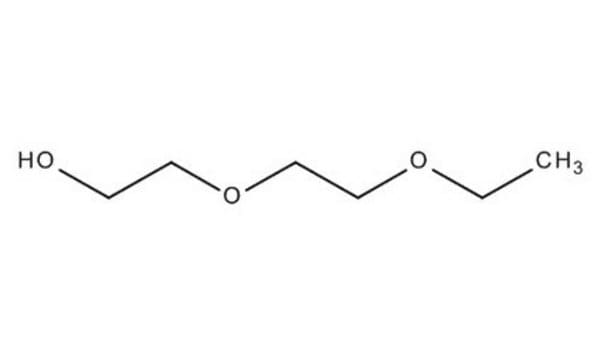8.02933
Diethylene glycol dibutyl ether
for synthesis
Sinónimos:
Diethylene glycol dibutyl ether
About This Item
Productos recomendados
vapor pressure
0.01 hPa ( 20 °C)
Quality Level
assay
≥98.0% (GC)
form
liquid
autoignition temp.
268 °C
potency
3900 mg/kg LD50, oral (Rat)
3555 mg/kg LD50, skin (Rabbit)
bp
254 °C/1013 hPa
mp
-60 °C
transition temp
flash point 118 °C
solubility
3 g/L
density
0.88 g/cm3 at 20 °C
storage temp.
2-30°C
InChI
1S/C12H26O3/c1-3-5-7-13-9-11-15-12-10-14-8-6-4-2/h3-12H2,1-2H3
Inchi Key
KZVBBTZJMSWGTK-UHFFFAOYSA-N
Application
- Transport and Association of Ions in Lithium Battery Electrolytes Based on Glycol Ether Mixed with Halogen-Free Orthoborate Ionic Liquid: This study explores the solvent properties of glycol ethers, including diethylene glycol dibutyl ether, in enhancing the performance of lithium battery electrolytes. The findings suggest that these solvents facilitate superior ionic mobility, potentially improving battery efficiency and safety (Shah FU, et al., 2017).
- Glymes as new solvents for lipase activation and biodiesel preparation: Diethylene glycol dibutyl ether is highlighted as an effective solvent for lipase activation, which is crucial in biodiesel production. This application demonstrates the solvent′s potential in biofuel technologies, enhancing enzyme activity and stability (Tang S, et al., 2013).
- Extraction and carrier-facilitated transport of amino acids using synthetic non-cyclic receptors through bulk liquid membrane: This research indicates the utility of diethylene glycol dibutyl ether in the selective transport and extraction of amino acids across synthetic membranes, offering insights into its applications in biotechnological and pharmaceutical industries (Joshi P, et al., 2006).
Analysis Note
Density (d 20 °C/ 4 °C): 0.882 - 0.884
Peroxide (as H₂O₂): ≤ 0.005 %
Identity (IR): passes test
Storage Class
10 - Combustible liquids
wgk_germany
WGK 1
flash_point_f
244.4 °F - closed cup
flash_point_c
118 °C - closed cup
Certificados de análisis (COA)
Busque Certificados de análisis (COA) introduciendo el número de lote del producto. Los números de lote se encuentran en la etiqueta del producto después de las palabras «Lot» o «Batch»
¿Ya tiene este producto?
Encuentre la documentación para los productos que ha comprado recientemente en la Biblioteca de documentos.
Nuestro equipo de científicos tiene experiencia en todas las áreas de investigación: Ciencias de la vida, Ciencia de los materiales, Síntesis química, Cromatografía, Analítica y muchas otras.
Póngase en contacto con el Servicio técnico







